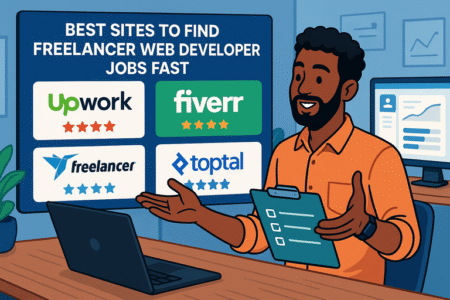I’ve asked myself “is freelancer worth it” more times than I can count, especially when weighing income stability against freedom and growth.
If you’re wondering whether freelancing can actually help you make good money—or if it’s just hype—this breakdown is designed to answer that honestly, from every angle that matters.
Table of Contents
Is Freelancer Worth It For Earning Real Money Long-Term
If your main concern is whether freelancing can actually lead to sustainable, long-term income, this is where the real answer lives.
Making good money as a freelancer is possible, but it depends heavily on skill level, positioning, and the industry you operate in.
Income Potential Across Different Freelance Skill Levels
When people ask is freelancer worth it, they often compare entry-level freelancing to senior salaried roles—and that’s an unfair comparison. Income varies dramatically by skill stage.
Beginner freelancers usually earn less at first. From what I’ve seen, many start between $15–$30 per hour while learning client communication, scoping, and delivery. This phase feels slow, but it’s temporary if treated intentionally.
Mid-level freelancers often hit $40–$75 per hour once they’ve delivered results and refined their niche. This is where freelancing starts to rival traditional salaries.
Advanced freelancers commonly charge $100+ per hour or use project-based pricing. At this level, income is tied less to time and more to outcomes.
A realistic progression looks like this:
- Year 1: Skill building and portfolio growth
- Years 2–3: Rate increases and repeat clients
- Year 4+: Premium positioning and leverage
Freelancing rewards growth faster than most jobs, but only if you actively raise your value instead of waiting for raises.
How Experience And Specialization Impact Freelance Rates
Specialization is the biggest income multiplier in freelancing. Generalists struggle. Specialists get paid.
For example, “web designer” is vague. “Shopify conversion-focused designer for eCommerce brands” commands higher rates instantly. Clients pay for reduced risk, not just skills.
In my experience, freelancers who specialize:
- Close deals faster
- Justify higher pricing without pushback
- Attract better clients organically
According to data from Upwork, specialized freelancers earn up to 3x more than generalists in the same category. Experience compounds when paired with a clear niche.
If you’re asking whether freelancing is worth it financially, specialization is often the deciding factor.
Freelance Income Compared To Traditional Employment Salaries
On paper, traditional jobs look safer. But when you compare earning ceilings, freelancing often wins.
A U.S. salaried professional earning $80,000 annually is capped unless promoted. A freelancer billing $80 per hour only needs about 20 billable hours per week to hit the same number.
Here’s the catch: Freelancers must handle taxes, healthcare, and downtime. But even after expenses, many experienced freelancers net more than employees with similar skills.
Key differences:
- Freelancers control pricing, employees don’t
- Freelancers scale with clients, employees scale with promotions
- Freelancers trade predictability for upside
This is why the question is freelancer worth it usually depends on how much you value income control over income certainty.
Industries Where Freelancers Consistently Earn More
Not all industries are equal. Some consistently reward freelancers better than full-time roles.
High-earning freelance industries include:
- Software development and engineering
- UX/UI design
- SEO and performance marketing
- Copywriting for SaaS and finance
- Data analytics and automation
For example, freelance SEO consultants often earn $3,000–$10,000 per month per client, while in-house SEO roles may cap at $70k–$90k annually.
If you’re in a skill-driven, results-based field, freelancing often unlocks income that salaried roles simply can’t match.
Is Freelancer Worth It When Income Stability Matters
Money isn’t just about how much you make—it’s about how predictable it feels. Income stability is where many people hesitate, and honestly, it’s a valid concern.
How Freelancers Handle Inconsistent Monthly Income
Freelance income is rarely even month to month, especially early on. One month might be great. The next might be quiet.
Experienced freelancers manage this by:
- Tracking rolling 3–6 month averages
- Separating personal and business finances
- Overbooking slightly to offset drop-offs
What helped me most was shifting mindset. Instead of asking “What did I make this month?”, I looked at quarterly trends. That alone reduced stress dramatically.
Income inconsistency doesn’t disappear—but it becomes predictable over time.
Retainers And Long-Term Contracts As Stability Tools
Retainers are the closest thing freelancers have to a salary.
A retainer is a monthly agreement where a client pays a fixed amount for ongoing work. Simple, predictable, and powerful.
Examples:
- $2,000/month SEO retainer
- $3,500/month content production contract
- $5,000/month paid ads management
Just three retainers can cover basic living expenses. Everything else becomes upside.
Freelancers with 60–70% of income from retainers report significantly lower financial anxiety, according to data from Freelancers Union surveys.
If stability matters to you, retainers aren’t optional—they’re strategic.
Emergency Funds And Financial Planning For Freelancers
Freelancers need bigger safety nets. That’s just reality.
A healthy benchmark is:
- 6–9 months of living expenses saved
- Separate tax savings account
- Monthly “low-income buffer” budget
This planning is what makes freelancing feel safe. Without it, every slow week feels like a crisis.
I suggest automating savings the same way employees rely on payroll deductions. Stability is built, not hoped for.
Seasonal Demand And Its Effect On Freelance Earnings
Most freelance businesses are seasonal—even if no one warns you upfront.
Common patterns:
- Q1: Slower budgets, planning mode
- Q2–Q3: High demand and strong cash flow
- Q4: Mixed, depending on industry
Smart freelancers plan promotions and outreach before slow seasons hit. They don’t panic when demand dips—they expect it.
Once you understand your industry’s rhythm, seasonality becomes manageable, not scary.
Expert tip: If you want freelancing to feel “worth it,” aim for a mix of 70% stable retainers and 30% flexible projects. That balance gives you both income security and growth potential without burnout.
Is Freelancer Worth It Based On Time And Flexibility
Time freedom is one of the biggest reasons people explore freelancing. But flexibility isn’t automatically a benefit—it’s a tool.
Whether freelancing is worth it here depends on how intentionally you use that control.
Control Over Work Hours And Project Selection
One of the most underrated advantages of freelancing is choosing when and who you work with. That alone can change how work feels day to day.
Here’s what control actually looks like in practice:
- Work hours: You decide if you work early mornings, late nights, or four long days instead of five short ones.
- Project selection: You can say no to low-paying or draining clients once your pipeline is healthy.
- Energy alignment: You schedule deep work when you’re sharp, not when a calendar tells you to.
I’ve found this control reduces burnout more than vacations ever did. That said, early-stage freelancers often work more hours than employees. The flexibility pays off later, not immediately.
If you’re asking is freelancer worth it purely for freedom, it becomes worth it once you stop saying yes to everything.
Balancing Billable Work With Personal Time
This is where freelancing quietly gets tricky. Billable work only pays when you’re actively working, so it’s easy to overdo it.
Smart freelancers protect personal time by:
- Setting billable hour caps: For example, no more than 30 billable hours per week.
- Time blocking non-work priorities: Family, exercise, or learning go on the calendar first.
- Using async tools: Apps like Notion or Slack reduce real-time interruptions.
A common mistake I see is confusing availability with professionalism. You don’t need to be reachable 24/7 to be valuable.
Freelancing rewards boundaries. Without them, flexibility turns into exhaustion.
How Time Freedom Translates Into Higher Earning Potential
Time freedom isn’t just lifestyle—it’s leverage.
When you control your schedule, you can:
- Focus on higher-value clients instead of cramming more hours
- Invest time into learning premium skills that raise rates
- Build systems that reduce delivery time
For example, a freelancer who automates reporting using Google Looker Studio can serve more clients in less time. Same hours. More income.
According to Payoneer’s freelancer report, top-earning freelancers work fewer hours on average than mid-level earners. They optimize time, not effort.
That’s when freelancing really starts to feel worth it.
The Hidden Cost Of Flexibility Freelancers Often Miss
Flexibility has a shadow side no one talks about.
Common hidden costs include:
- Difficulty “turning off” work
- Guilt when not working during business hours
- Decision fatigue from constant choices
In traditional jobs, structure is provided. In freelancing, you must create it yourself.
From my experience, freelancers who build routines—not rigid schedules—handle flexibility best. Freedom works when paired with self-imposed structure.
Is Freelancer Worth It After Taxes And Expenses
This is the section that scares people—and rightly so. Freelancers earn gross income, not net. Understanding the math is essential to deciding if freelancing is worth it.
Self-Employment Taxes And What Freelancers Actually Pay
In the U.S., freelancers pay self-employment tax, which covers Social Security and Medicare. It’s about 15.3% before income tax.
That sounds high, but here’s the nuance:
- You can deduct business expenses
- You can write off part of self-employment tax
- You often pay less overall if planned correctly
Many freelancers work with tools like QuickBooks Self-Employed or hire a CPA to estimate quarterly taxes. Those estimates remove surprises.
Taxes aren’t higher because you freelance. They’re higher when you don’t plan.
Common Freelance Expenses That Reduce Take-Home Pay
Expenses eat into income—but they also reduce taxable earnings.
Common deductions include:
- Home office portion of rent or utilities
- Internet and phone bills
- Education, courses, and certifications
- Marketing and software subscriptions
A freelancer earning $100,000 might only be taxed on $75,000 after deductions. That changes the math significantly.
The key is tracking everything consistently, not perfectly.
Tools, Software, And Services Freelancers Must Budget For
Freelancers pay for tools employees get for free. That’s the tradeoff.
Typical monthly costs:
- Project management tools like Trello or ClickUp
- Invoicing software like Wave or FreshBooks
- Cloud storage such as Google Drive
Here’s a quick comparison:
| Category | Employee | Freelancer |
| Software | Employer-paid | $50–$300/month |
| Hardware | Employer-paid | Self-funded |
| Training | Limited | Fully deductible |
These costs matter—but they’re also what enable higher income.
Net Income Comparison Between Freelancers And Employees
After taxes and expenses, freelancers often still come out ahead—but not always.
Freelancers win when:
- Rates are positioned correctly
- Expenses are controlled
- Downtime is planned for
Employees win when benefits are generous and salaries are capped high.
This is why is freelancer worth it is less about gross income and more about net lifestyle value.
Is Freelancer Worth It For Career Growth And Security
Career growth looks different outside traditional ladders. Freelancing trades predictability for adaptability.
Skill Acceleration Through Diverse Client Projects
Freelancers learn faster. Period.
Working with multiple clients exposes you to:
- Different industries and problems
- Faster feedback loops
- Broader skill application
In one year, a freelancer might touch projects that would take five years in a single company.
That speed compounds value—and future income.
Building A Personal Brand Versus Climbing A Company Ladder
Employees grow inside companies. Freelancers grow in public.
A personal brand might include:
- A niche-focused website
- Case-based LinkedIn posts
- Referrals from past clients
Unlike job titles, personal brands travel with you. That’s long-term security many overlook.
Freelance Career Longevity And Market Demand Shifts
Freelancing isn’t immune to market changes. Skills age.
Sustainable freelancers:
- Refresh skills every 12–18 months
- Follow demand signals, not trends
- Shift niches when needed
Adaptability is the real job security now.
Risk Management When Freelancing Is Your Main Income
Risk doesn’t disappear—it’s managed.
Smart freelancers reduce risk by:
- Diversifying clients
- Maintaining savings buffers
- Keeping employable skills sharp
In my view, freelancing is worth it when you treat it like a business, not a gamble.
Best practice: If you want freelancing to feel secure and flexible at the same time, build structure intentionally. Freedom works best when you design guardrails around it, not when you wing it.
Is Freelancer Worth It For Different Personality Types
Freelancing rewards certain traits and quietly punishes others.
This section isn’t about labels—it’s about honest self-awareness. Whether freelancing is worth it often comes down to how you’re wired.
Who Thrives In Freelancing Versus Who Struggles
From what I’ve seen, freelancers who thrive aren’t always the most talented. They’re usually the most adaptable.
People who tend to thrive:
- Comfortable making decisions without permission
- Willing to market themselves, even imperfectly
- Able to handle feedback without taking it personally
People who often struggle:
- Need external structure to stay productive
- Avoid sales or client conversations
- Expect clear instructions instead of ambiguity
This doesn’t mean freelancing is off-limits if you lean toward structure. It just means you’ll need systems sooner. Tools like ClickUp or Notion (simple task and planning apps) can replace the structure a boss usually provides.
Freelancing is less about personality type and more about how willing you are to build support around your weaknesses.
Self-Discipline And Motivation Requirements
Freelancing removes external pressure. No manager. No deadlines unless you create them.
That freedom sounds amazing until motivation dips.
What actually helps:
- Fixed start and stop times, even if flexible
- Clear weekly income targets, not vague goals
- Separating “work mode” from “home mode,” even in small spaces
In my experience, motivation fades. Discipline stays. Freelancers who rely on motivation burn out fast.
If you can follow through without being watched, freelancing starts to feel empowering instead of overwhelming.
Decision-Making Pressure And Client Accountability
Freelancers make decisions constantly:
- Which clients to take
- How much to charge
- When to push back or walk away
That pressure adds up. There’s no HR department or manager to hide behind.
Client accountability also hits differently. If a project fails, it’s personal. That can sting—but it also accelerates growth.
I believe this pressure is what sharpens freelancers faster than most employees. But it’s not light. If you hate ownership, freelancing will feel heavy.
Evaluating Personal Risk Tolerance And Work Style
Freelancing comes with uncertainty by default. The real question is how you respond to it.
Ask yourself:
- Can you handle uneven income emotionally, not just financially?
- Do you prefer autonomy over predictability?
- Are you comfortable experimenting without guarantees?
There’s no “better” answer here. Just honest ones.
Freelancing is worth it for people who can sit with uncertainty without panicking—and build plans instead of spirals.
Is Freelancer Worth It Compared To Hybrid Or Side Hustles
You don’t have to go all in. In fact, I usually recommend not doing that right away. Freelancing exists on a spectrum.
Freelancing As A Side Income Before Going Full-Time
Starting freelancing on the side is often the smartest move.
Benefits:
- You test demand without financial pressure
- You build proof before relying on it
- You learn client management safely
A common pattern I’ve seen work well:
- Start with one paying client
- Reach 30–50% of your salary
- Build a 3–6 month savings buffer
- Then consider full-time
This approach answers “is freelancer worth it” with real data, not guesses.
Hybrid Models Combining Freelance And Employment
Hybrid models are underrated.
Examples include:
- Part-time job plus freelance clients
- Contract role with flexible hours
- Remote employment alongside consulting
These setups offer:
- Stable baseline income
- Benefits coverage
- Reduced stress during slow months
Many freelancers stay hybrid long-term—and that’s not failure. It’s strategy.
When Freelancing Makes Sense As A Long-Term Path
Freelancing tends to work long-term when:
- You have in-demand, results-based skills
- You can raise rates faster than expenses grow
- You enjoy autonomy more than hierarchy
At this stage, freelancing becomes a business, not just work. Systems matter more than hustle.
Exit Strategies If Freelancing Stops Being Profitable
This part doesn’t get enough attention.
Smart exit options include:
- Returning to employment with stronger skills
- Moving into consulting or in-house leadership
- Pivoting into education or productized services
Freelancing skills transfer well. You’re rarely stuck.
Knowing you can exit actually makes freelancing less risky psychologically.
Is Freelancer Worth It If Your Goal Is Financial Freedom
If financial freedom is the goal, freelancing is a tool—not the finish line. Used well, it can accelerate options.
Scaling Freelance Income Beyond Hourly Rates
Hourly work caps income. Scaling removes that ceiling.
Common scaling paths:
- Project-based pricing
- Monthly retainers
- Productized services with fixed scopes
For example, a $5,000 monthly service delivered efficiently can outperform 40 billable hours easily.
Freedom increases when income detaches from time.
Transitioning From Freelancer To Agency Or Consultant
Many freelancers eventually shift roles.
Options include:
- Small agencies with subcontractors
- High-level consulting with fewer clients
- Fractional roles (part-time executive-style work)
Each step trades execution for strategy. Income often stabilizes and grows—but complexity increases too.
Leveraging Freelance Skills For Passive Income Streams
“Passive” is rarely fully passive—but leverage exists.
Examples:
- Courses based on proven workflows
- Templates or toolkits
- Paid communities or newsletters
These work best after real client experience. Freelancing builds the raw material.
Defining Success Beyond Just Monthly Income
Here’s the quiet truth: money alone doesn’t equal freedom.
Real freedom looks like:
- Control over time
- Choice over projects
- The ability to step back without panic
Freelancing is worth it when it supports the life you want, not when it replaces one kind of stress with another.
Final tip: If you’re unsure whether freelancing is worth it for you, don’t decide emotionally. Test it deliberately. Small steps, real data, honest reflection—that’s how clarity shows up.






